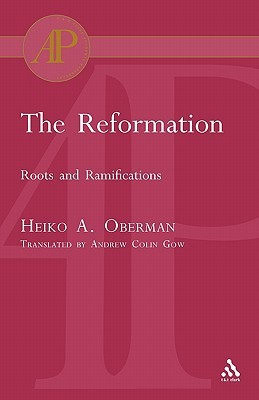
- We will send in 10–14 business days.
- Author: Heiko Oberman
- Publisher: CONTINNUUM 3PL
- ISBN-10: 0567082865
- ISBN-13: 9780567082862
- Format: 16.8 x 21.7 x 1.4 cm, softcover
- Language: English
- SAVE -10% with code: EXTRA
Reviews
Description
In this wide-ranging volume Heiko Oberman traces threads of continuity flowing to and through the Reformation. Many his most important studies appear here in English for the first time.
Professor Oberman explores experiential mysticism; the battle on two fronts waged by the Wittenburg circle against Pierias and Eck; Luther's medieval and apocalyptical conception of reformatio and its purpose; the pre-history of confessionalization in the Confession of Ausburg and its Confutatio byt Luther's Roman opponents; Zwingli's plans for a Godly alliance in the southern Germanic ecumene and the destructive tensions between Zwingli and Luther.
In the final chapter, Oberman describes a model of three long-term Reformations that can also be seen as revolutions: the Concillar Reformation, the City Reformation, and the Calvinist Reformation of the Refugees. The often denied and generally misunderstood continuities between theological directions of the later Middle Ages, the theological reformation of the early sixteenth century and subsequent developments are constantly illuminated through exacting detail and compelling insights.
EXTRA 10 % discount with code: EXTRA
The promotion ends in 20d.04:12:31
The discount code is valid when purchasing from 10 €. Discounts do not stack.
- Author: Heiko Oberman
- Publisher: CONTINNUUM 3PL
- ISBN-10: 0567082865
- ISBN-13: 9780567082862
- Format: 16.8 x 21.7 x 1.4 cm, softcover
- Language: English English
In this wide-ranging volume Heiko Oberman traces threads of continuity flowing to and through the Reformation. Many his most important studies appear here in English for the first time.
Professor Oberman explores experiential mysticism; the battle on two fronts waged by the Wittenburg circle against Pierias and Eck; Luther's medieval and apocalyptical conception of reformatio and its purpose; the pre-history of confessionalization in the Confession of Ausburg and its Confutatio byt Luther's Roman opponents; Zwingli's plans for a Godly alliance in the southern Germanic ecumene and the destructive tensions between Zwingli and Luther.
In the final chapter, Oberman describes a model of three long-term Reformations that can also be seen as revolutions: the Concillar Reformation, the City Reformation, and the Calvinist Reformation of the Refugees. The often denied and generally misunderstood continuities between theological directions of the later Middle Ages, the theological reformation of the early sixteenth century and subsequent developments are constantly illuminated through exacting detail and compelling insights.


Reviews